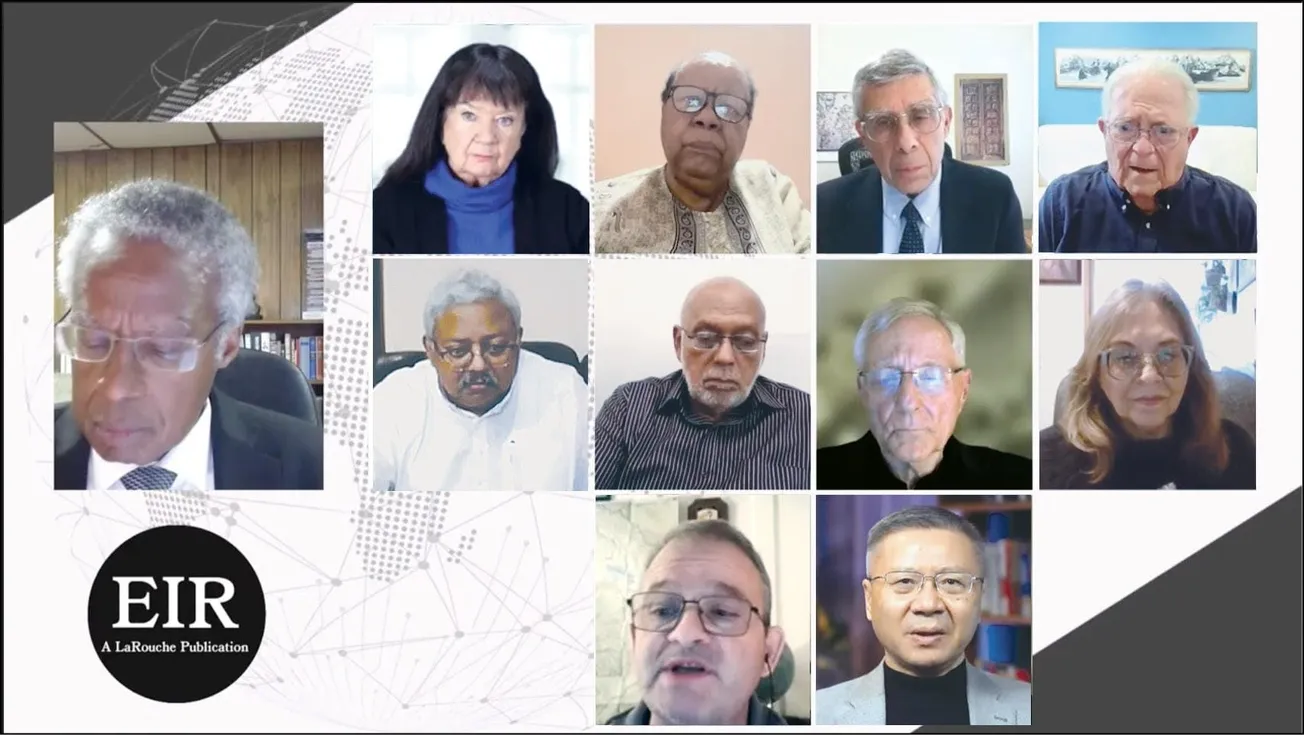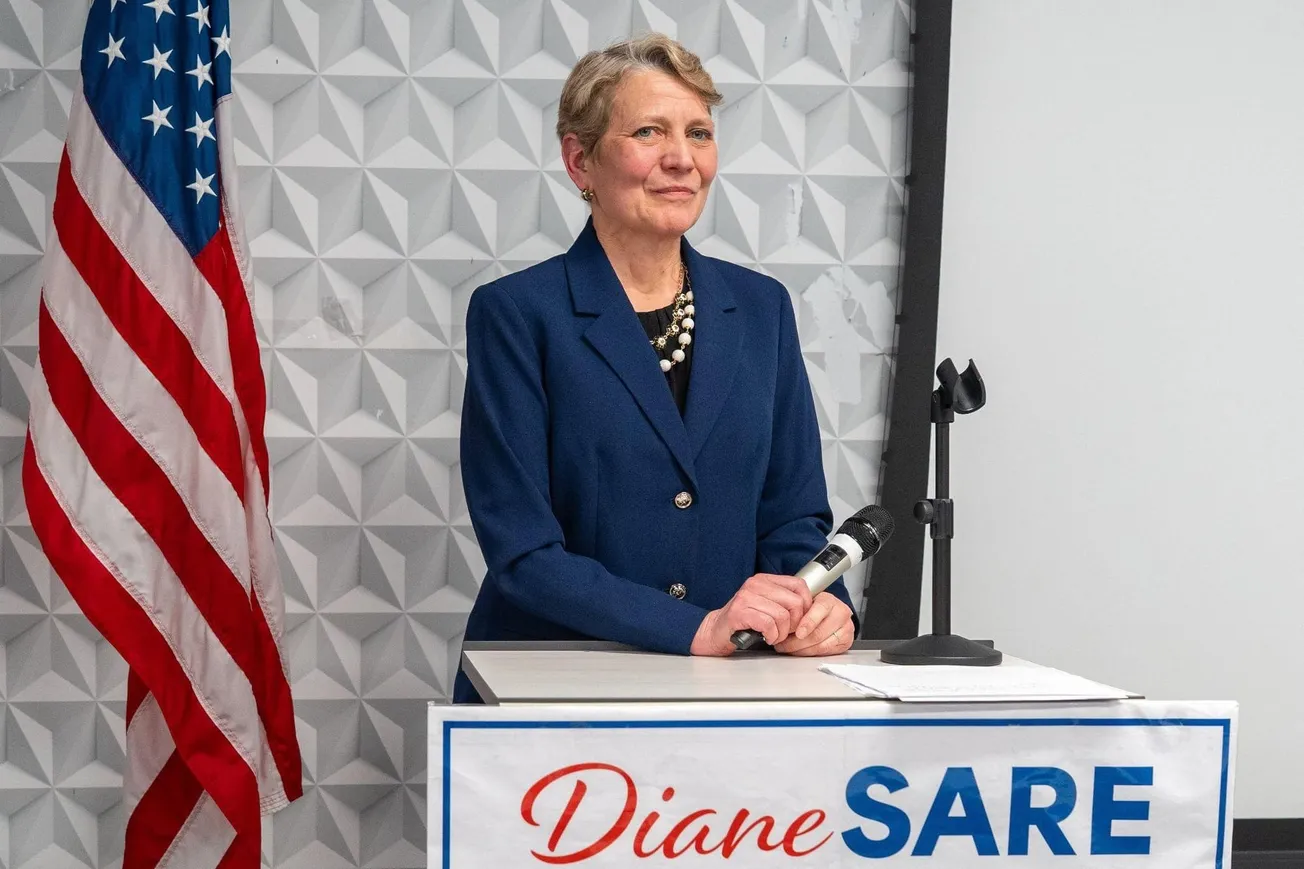This is the edited transcript. The video of the entire program is available here. Subheads have been added.

Harley Schlanger: Hello and welcome to our weekly dialogue with Helga Zepp-LaRouche, founder and leader of the Schiller Institute. Today is Wednesday, Oct. 4, 2023. I’m Harley Schlanger and I’ll be your host.
A lot of what we’ll be discussing today is around the situation of the NATO proxy war in Ukraine against Russia. There have been a number of important developments: The EU and NATO this past week showed their foolish commitment to a continuing war, by having their foreign ministers flock to Kiev and making promises to continue this to the end, regardless of the loss of Ukrainian lives, or the wreckage that they’re imposing on their own countries’ economies. In the United States, the Speaker of the House was ousted, in a fight that was really over his breaking of his pledge to stop funding the war in Ukraine, and his duplicity on the question of war funding. And we’re seeing changes in Europe, with a deepening split between Ukraine and Poland, an anti-war party in Slovakia getting the most votes in the national election on Saturday, Sept. 30 and a sign of life for the anti-war movement in Germany, where support is growing for a proposal for a negotiated peace that was put forward on Aug. 28, by four very prominent Germans.
Helga, let’s open with your thoughts on this strategic conjuncture, how you see it, and where you think things are headed?

Helga Zepp-LaRouche: It is promising, dangerous, fascinating, and hopeful. I do not want to downplay the war danger, because the situation in Ukraine remains a meatgrinder, with the British again and again making efforts to escalate the war. The new British Defense Secretary Grant Shapps had the wild idea to send the British Navy into the Black Sea to defend Ukrainian vessels, and to send British soldiers to Ukraine to train Ukrainians there. This was too much for even Prime Minister [Rishi] Sunak, who went against Shapps. The commitment by the neocons and the British Empire forces is to escalate the war.
The McCarthy Ouster

The whole thing is breaking apart in this dangerous environment. You mentioned the ouster of Kevin McCarthy, the Speaker of the U.S. House of Representatives. Now that is a fascinating story, because it was unexpected, it had never happened before. It was a combination of 8 Republicans and about 200 Democrats, voting 216–210. But the really interesting story is that what Matt Gaetz, the Republican Congressman from Florida, said, as to what was behind that: Namely, that the U.S. annual debt is $2 trillion, that the United States has a total debt of $33 trillion and that that is untenable, especially now—and this was important that Gaetz brought this out in the Congress—that there is a massive de-dollarization going on where many countries are just moving out of the dollar, moving to trade in their own national currencies, and that that is now, indeed, becoming a factor.
This is not a natural catastrophe; this is a manmade disaster, because this is a blowback. If the United States and the British would not have pushed this NATO war, and the six NATO expansions to the East that finally involved the Maidan coup in Ukraine in 2014, and all of the developments that led up to the war in Ukraine, the subsequent sanctions against Russia, which were part of the weaponization of the dollar. Look at the seizure of assets of Russia, of Afghanistan, and of other countries. The people pushing this policy thought they could get away with anything, because they are the unipolar world, but the vast majority of the human species looked at that, and said, hey, wait a second, if working with the hegemon, with the United States is bringing all of this, and we have to pay the bill, maybe that’s not such a good idea.
So, there was a tremendous blowback. The BRICS—Brazil, Russia, India, China and South Africa—developed a tremendous momentum at their August Johannesburg summit, with six new members joining: Iran and Saudi Arabia, Egypt, Ethiopia, the United Arab Emirates, and Argentina. And 40 more countries have applied for membership in the next period.
There is right now a complete reorientation of the world, a new paradigm developing, in response to the effort to impose a unipolar world, when it clearly had no basis anymore, and probably never did have. Now, you have the first casualty, so to speak, in the form of this Speaker of the House, who was trying to push through a bill that would have meant, among other things, an ongoing money and weapons flow to Ukraine. A lot of people in the United States say that is money the United States citizens don’t have any more, who are faced with collapsing infrastructure, who are in a terrible social and cultural crisis.
A Peace Proposal from Prominent Germans
All of this is happening very dramatically. Within that, fortunately, there is a growing effort to get a peaceful resolution. You mentioned the paper by these four prominent Germans—I think we discussed it already last week—but I want to reiterate it: This is a paper presented by Gen. Harald Kujat (ret.), who was formerly the highest military officer in Germany; Prof. Horst Teltschik, a top diplomat in the time of the German reunification and longtime President of the Munich Security Conference; Prof. Hajo Funke, a historian from Berlin; and Prof. Peter Brandt, the son of Willy Brandt. Their paper is circulating widely. The International Peace Coalition (IPC) we have initiated, which is growing and quickly expanding, is mobilized to get it published in as many countries as possible, and we made some breakthroughs: The paper was published in EIR, Oct 6, and has been commented on in Italy, France, Switzerland, Mexico, and probably a couple of others. Others are promoting this paper. There is a growing idea that the war must end through peace negotiations, and this paper contains a very concrete proposal for how that can be done.
That is one major vehicle for those people who really want to stop the danger of World War III, so we are publishing a link to their paper in this webcast, and I’m asking all of you to help to spread it. If you have any means of publication, blog, some platform or a print publication, please reprint it, get people to comment on it, and make it known. You need a rallying point.
While there has been some criticism—we got some very sharp reactions from people who said the German Peace proposal is completely unrealistic because Russia will never go for it, Russia does not trust the West anymore, well, that is true. But what Russia thinks is determined by what the West does, and if we can mobilize a significant force for peace in the West, I’m absolutely sure that the attitude of Russia will also change, because I don’t think Russia wants to have World War III. But they don’t want to capitulate to a West which is duplicitous and not honest. But if we mobilize an honest peace movement, I think we have a chance to end this war with diplomacy.
The ouster of McCarthy from his position in the House over these issues should give everybody a tremendous boost, and sense of optimism that you can do something to bring down a tyrannical order. We should absolutely be optimistic and keep building the peace movement: The IPC is going to expand, so join us in this effort, and let’s just recognize the fact that the world is changing very rapidly, and there’s absolutely nothing that can put that genie back into the bottle!
The only reasonable attitude is that we have to get the Western countries to join with the global majority and build a new system, a new paradigm of international relations. If the Western countries would express that, everything could be solved, because I’m absolutely 100% certain that the BRICS countries and the countries of the Global South would more than welcome a positive attitude coming from the West.
Another Multi-Billion Dollar Package for Ukraine
Schlanger: We have a question about the deliberations in the House and Senate last week. He points out that U.S. President Joe Biden had asked for over $20 billion in new money to be made available for Ukraine, that it was reduced to $6 billion, and then it was completely taken out from the budget in the bill that went through. But he asks:
“Does that mean that they’re not going to spend more money? Or that they’re still going to try and bring it up again?”
Zepp-LaRouche: Knowing who the vested interests are who are hanging on that—those of the military-industrial complex—I’m sure they will bring it up again. But for the time being, there is an objective bottleneck, and the bottleneck is that not only was that money not approved in this round, but the stockpiles of ammunition in the United States and even in European countries, is running so low, that it puts at risk the national defense requirements of the countries involved. Now that is very interesting, because, in the meantime, Russia, after one and a half years of war, is not faced with such problems, but has built up its war economy quite efficiently.
I think it is time for the West to realize that they would do much better and act in the interests of their own citizens, if they would stop this focus on military and get the economy going! Because the United States economy is in shambles, infrastructure is collapsing, there are terrible social problems all over the place. Germany is in a free fall as a result of the sanctions against Russia, the sabotage of the Nord Stream pipelines, the increase in energy prices which will really explode in the coming fall and winter. Almost half of German industry is either folding up, going bankrupt, or saying they cannot afford to stay in Germany any longer, and are going into foreign countries for investment—either the United States or China. Germany is facing a tremendous economic, and also social crisis as a result.
So, it’s really time to rethink, and if the governments that are pushing these policies are unable to rethink, they must be replaced: That is in the U.S. Declaration of Independence. That is a fundamental right of its citizens. In the German case, upon assuming office, every minister and chancellor takes an oath that they will defend the interests of the German people, that they will increase the benefit to them, and prevent them from suffering damage. Government officials violate that every day, every hour, then they should be replaced at the earliest possible time.
Pressure To Break with Russia
Schlanger: Helga, following up on this theme, we have a questioner who quotes something you had said recently, and asks:
“What did you mean when you said nations of the Global South, of Latin America, Asia, and Africa, are ‘defiantly unconvinced of the righteousness of the Ukrainian cause’?”
She then says that she thinks that African nations are among those strongly supporting Russia. Would you comment on that?
Zepp-LaRouche: A major effort was made by American administration officials, EU officials, representatives of various European governments, travelling around the world to Latin America, Asia, and Africa, to assert maximum pressure on these countries that they should condemn the so-called “Russian aggression,” and join with the so-called “democracies.” That effort has been a complete failure. The countries of the Global South, in general, except some which were too weak to resist such pressures, basically refused to do that. They insisted on taking a non-aligned position, and that they do not want to become a pawn in this geopolitical confrontation.
The reason why they are doing that is pretty obvious, because what is happening in terms of attacks on Russia—by the media, by the politicians—and on China, these countries have experienced something completely different. They have experienced that the so-called West, especially the United States but also the European colonialist powers, offered only military kinds of cooperation, things relating to training troops, security issues—but no economic development. And then these countries look at Russia and China, and see that they’re offering economic development, infrastructure, ports, airports, nuclear plants; and they say, well, Russia and China are helping us to overcome underdevelopment; maybe they are our friends. Especially in some countries, the memory of colonialism is extremely vivid! In the fight for independence of the African nations—who was on their side? It was the Soviet Union.
So, in one sense, the recent period has been like a watershed, where a lot of things which were covered under narratives and stories and so forth, is now all out in the open: That the countries of the Global South do not want to continue the colonialist system, and who do they associate colonialism with? the U.S., the British, the Europeans.
The World is experiencing a tremendous change. If the European countries and the United States want to get back into the confidence of the countries of the Global South, they have to change dramatically. They should admit that they were wrong, that they tried to continue the colonialist system with modern means, through trade regulations, through conditions of credit, through forcing the countries of the Global South to only export their raw materials, not allow them to engage in reprocessing and going up in the production value chain, so that they would get the benefit of their own resources. And they have looked through that: It’s not a secret!
Now, The nations of Africa, Latin America, South and Southwest Asia are moving in the direction of taking the help of especially China, but also Russia and other countries, to improve their production chain. They have the desire to become middle-income countries in the intermediate term or even short term. That’s such a good thing! If the people in the North had any good sense, they would be joyful about it. The United States, after all, had led and won the first anti-colonialist war against the British Empire in 1776, so they should be happy about what these other countries are doing, remember their own anti-colonialist tradition, rather than siding with their former colonialist master, the British Empire!
What Will It Take?
Schlanger: We’re continuing to get a certain amount of skepticism about the possibility for a negotiated settlement:
"Why would Russia negotiate with the West, after all the broken promises?”
Then another one:
“How can the anti-war movement in any political party be heard, when people refuse to accept the reality of the situation due to wartime propaganda?”
Zepp-LaRouche: That is a very common view in Russia by people who look at it from the standpoint of Russian interest, and they are very harsh. For example, the statement by the four Germans contains early on the phrase: “Russian war of aggression” against Ukraine. Many people take issue with that formulation. I think that a later sentence in that paper, is nevertheless, reasonable:
“However, far-reaching decisions on the expenditures necessary to continue the war, contrary to all reason and despite the unachievable nature of the political goals, must not be left to the Ukrainian government alone.”
So don’t get hung up on that first sentence, which begins “Since the beginning of the Russian war of aggression on Feb. 24, 2022, Ukraine has been waging a legitimate war of defense in which its survival as a state, its national independence and security are at stake.” Gen. Kujat was the Chairman of the Military Committee of NATO; he was the highest military person of the German Bundeswehr, and Prof. Horst Teltschik is of a conservative tradition of the Christian Democrats. Don’t expect people to not say something which they feel has to appeal to what the majority of the population thinks. But it’s just one sentence, and the whole rest is basically very constructive and aimed to win over the people of every political faction in Germany. I have not talked to the four authors about their motives in writing the Proposal the way they did, but I’m pretty sure that they want to stop the war, and they know perfectly well that the escalation comes from NATO. It’s obvious; nobody can miss the point.
So, what do you do? The Russians are determined to win on the battlefield, but NATO, at least up to now and; people such as [NATO Secretary General Jens] Stoltenberg and [German Foreign Minister Annalena] Baerbock et al. have said they have to “ruin Russia,” Russia has to be made completely unable to continue this policy; and Ukraine must win. So, if you have two sides that both say that they have to win, then you are on the course of World War III.
If, however, the Kujat-Teltschik-Funke-Brandt proposal gains enough momentum to impact this extremely fluid strategic situation, some negotiation can be arranged. A lot of people are in motion: the Brazilian President Lula da Silva, the African states, the Vatican, Türkiye’s President Recep Tayyip Erdoğan, the Chinese proposal. I think the aim is to convince the war faction in the West, to weaken them, and to get those people to the foreground who want to stop the war. And then the Russians will look at it completely differently.
The Possibility of a Just and Lasting Peace
If Russia saw anything in the West worthwhile, regaining trust, I’m absolutely sure that they would go back to the kind of negotiation which was on the table in March 2022, where Ukrainian President Volodymyr Zelenskyy had agreed to it; Erdoğan had mediated; the idea was of a neutral Ukraine. Then UK Prime Minister Boris Johnson came to Kiev, and everything was nixed. The Minsk process: There were efforts which could have led to a peaceful resolution.
I’m convinced that if this German Peace Proposal gains momentum, the Russian position will change. But the Russian position will only change if there is a very credible force in Europe and in the United States—or at least in Europe, because without Europe, the United States could really not carry this through—to stop it.
People should really give up the idea that you can’t do anything, anyway. If Germany, for example, were to move forcefully in the direction of the proposal of these four people, the war would stop, because all of Europe would follow.

Look at what is happening: The new election winner in Slovakia, Robert Fico’s SMER party. Fico who has previously served two times as Prime Minister, is eminently for stopping the weapons sales to Ukraine; he’s for peace negotiations; and he has a good chance of forming the next government. Hungary: the same thing. In France, the mood is very explosive, and could go either way. A tremendous battle is going on in Italy. So, Germany is really the key. People should really have the sense that the war can be stopped, and the ouster of McCarthy should be an example of what you do with politicians who are war hawks.
Schlanger: I think it’s very clear from what you just said, Helga, that our viewers have a responsibility, now, to drop their questions and become more actively involved in the organizing. That’s related to a few more questions that have come in on what’s happening with the BRICS. It appears that the BRICS are getting stronger, as you mentioned earlier.
Towards a System of Credit Systems
We have a question from Algeria about the new financial system:
“It can’t come fast enough for me. What is the progress to replace the unipolar order since the BRICS summit?”

Zepp-LaRouche: That, also, is having nonlinear effects. The New Development Bank is starting to issue bonds in national currencies. That is very important, because that is the kind of credit creation which is needed. The idea of a BRICS currency, that’s a little bit more difficult. One important development which is taking place in Russia right now. The head of the Central Bank, Elvira Nabiullina, a leftover from the Boris Yeltsin tradition. She is, I would say, a neoliberal financial monetarist, and she has prevented a lot of kinds of changes which, for example, the Russian economist Sergei Glazyev had been proposing, who actually wrote a book on why China should be the model for Russia.
Now, Nabiullina felt compelled to attack the Chinese financial system, by making the rather absurd statement that China had tried to liberalize the economy for decades but had failed to do so. That’s just not true: China has been doing exactly the opposite, by curbing investments in speculative areas, forbidding Chinese people from going overseas and investing abroad in speculative areas. So, she is just factually wrong, to say the least. But that has now caused a very interesting debate inside Russia, where she is being attacked, and the Chinese model is being discussed broadly.
Now, that would require [the reversal of] some arrangements which were made in the aftermath of the Yeltsin legacy, but if Russia would very clearly adopt the Chinese model, it would benefit Russia tremendously, and there’s no reason why Russia, with its incredible scientific potential, could not replicate the Chinese model in a very powerful way.
These are the changes which are taking place. De-dollarization was a factor in the developments and what just happened in the U.S. Congress, gives a foretaste of the message that will come more strongly even to the most hard-core people in the West who want to stick to the old order, that they will have to change.
So, I can only agree: It should be done quickly, but I’m absolutely certain that it will happen.
Report-Back from China
Schlanger: I have a question for you from one of our viewers, who watched the Manhattan Project program last Saturday, which was a discussion of young people who represented the Schiller Institute in a delegation that visited China and had a lot to report on that. The viewer asks:
“How important is this kind of person-to-person diplomacy in reversing the hostile view of the propagandists who want to have a war against China?”
Zepp-LaRouche: I think it is super-important, because the enthusiasm with which the 15 delegates came back is contagious! I was talking to some of the people who were in that delegation. They just confirmed everything everybody who goes to China comes back with. Businessmen who invest there, tourists, people who marry into a Chinese family, all report the same thing. What these 15 young people experienced is completely genuine. And for those critics and cynics in the West who say, “this is all Chinese propaganda,” well, think for a second: You cannot induce 1.4 billion people to make a show!
What they have seen in terms of the optimism of the Chinese people, in terms of their dedication, in terms of their desire to make things work, that comes across in every encounter in China, so you cannot make it up—it’s real. I gave a speech in 2001 in Reston, Virginia, which had the title, “Why Americans Should Go There: Eurasian Land-Bridge Determines Your Future.” It was a report on the ancient Silk Road and the modern New Silk Road, and why people, indeed, should travel there and get a sense of the incredible depth of the culture which they will find.
People-to-people discussion is extremely important, because if I were not convinced that the people of every country are essentially good, I would have given up politics for a long time. It’s the oligarchical structures that have usurped nations, which is the reason why the political situation has become so terrible in the last decades. But the majority of people, the ordinary farmer, the ordinary craftsman, the ordinary doctor, nurse, construction worker, engineer, all want to make things work! And in China the work ethic is much, much better than in the West. I keep saying that the Chinese right now have all the virtues that the Germans used to have, but which we have unfortunately lost. But it can spread back.

I can only encourage you: Save up a little money, get yourself a ticket and spend your next vacation in China. And then next year, in India, and in Africa—get to know the world. It’s one of the most rewarding things you can do, because it broadens your horizon, it makes clear that there are whole universes to be discovered, when you find out about ancient cultures of another part of the world. I’m very happy about this, and can only fully suggest that you do likewise.
Schlanger: And the discussion from the Manhattan Project, there’s a link to the video of the Manhattan Project discussion here, on The LaRouche Organization website, so you can get a sense for yourself of the excitement of the young people who went there.
Helga, thanks again for joining us. The debate that’s going on is worthwhile, because what comes up is whether people want to have a solution or an excuse. But we’re past the point where excuses are acceptable. Do you have any final comments?
Zepp-LaRouche: Yes: We are trying to build this International Peace Coalition, so that it becomes so powerful that its voice cannot be passed over. So, if you are a peace activist, or you wish to be a peace activist, contact us, make the activities of the IPC known to other people, because we want to open things up. We will have a big event in about 10 days, so you should absolutely become active with us. This is not a moment in history to just contemplate: This is a moment when it is you, and many other individuals can make the difference.
Schlanger: With that, Helga, thank you for joining us, and we’ll see you again next week.
Zepp-LaRouche: Yes, till next week.







